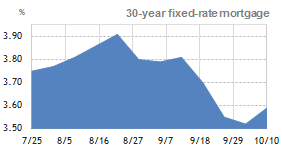Mortgages bump up but remain in refi range
Mortgage rates bounced up from record lows this week after investors became somewhat more optimistic about the job market in the United States. But refinancers can still grab a good deal while rates are near the bottom -- even if they are underwater on their mortgages.

30 year fixed rate mortgage – 3 month trend
The benchmark 15-year fixed-rate mortgage rose to 2.88 percent from 2.84 percent. The benchmark 5/1 adjustable-rate mortgage rose to 2.68 percent from 2.67 percent.
Weekly national mortgage survey
Results of Bankrate.com's Oct. 10, 2012, weekly national survey of large lenders and the effect on monthly payments for a $165,000 loan:| 30-year fixed | 15-year fixed | 5-year ARM | |
|---|---|---|---|
| This week's rate: | 3.59% | 2.88% | 2.68% |
| Change from last week: | +0.07 | +0.04 | +0.01 |
| Monthly payment: | $749.24 | $1,129.96 | $667.50 |
| Change from last week: | +$6.47 | +$3.15 | +$0.87 |
The report is closely watched by investors, who like to keep their fingers on the pulse of the economy. When investors feel more confident about the economy, they seek riskier investments, and mortgage rates tend to rise.
"There's a lot of controversy over the (unemployment) number, but it's still a headline-grabbing number, and headlines move markets," says Michael Becker, a mortgage Banker at WCS Funding in Baltimore.
The jobs report isn't the only factor to blame for the higher rates on mortgages, Becker says.
"Any time rates dip as low as they did, they are bound to go back up," he says.
Underwater borrowers finally benefit from low rates
Last week's record-low mortgage rates kept lenders busy as they processed refinance applications from homeowners, including those who owe more than what their homes are worth.The revamped version of the Home Affordable Refinance Program, or HARP 2.0, that went into effect earlier this year allows homeowners to refinance eligible Fannie Mae and Freddie Mac loans, regardless of how deep underwater they are.
Even with HARP 2.0, many homeowners continued to face obstacles when they applied to refinance because some lenders kept their internal caps on underwater loans, usually 125 percent to 150 percent of a home's value.
Fannie recently issued guideline clarifications on HARP loans, which made some lenders and mortgage companies confident enough to lift their restrictions on HARP loans.
"We have a much higher level of comfort with the new guidelines that were put in place. They are much more specific," says Rob Nunziata, president of FBC Mortgage in Orlando, Fla., which removed the cap on its HARP loans a couple of weeks ago.
Nunziata says he is still swamped with applications from borrowers who want to refinance through HARP.
Homebuyers prepare to shop
Homebuyers also want to take advantage of the low rates, say Bob Moulton, president of Americana Mortgage Group in Manhasset, N.Y. He has noticed increased interest from potential buyers seeking mortgage preapprovals as they start shopping for a home."There are a lot of people looking to buy who are sending in their documents to get ready for when they find a home," Moulton says. "Winter is a pretty good time to buy. In the spring when the houses are showing well, people try to sell for higher prices."
How much time do borrowers have left?
There's no question that rates will eventually climb higher, but if you are not ready to refinance or buy yet, there's no need to panic. Mortgage specialists say they don't expect any major increases in mortgage rates, at least until the election.
Keep in mind that the Federal Reserve is spending about $40 billion a month in purchases of mortgage bonds, and that will help keep rates low for now -- but not forever.
"Honestly, I don't think much is going to happen in the (next) week or two, but I wouldn't get too complacent," Moulton says. "Normally, if rates do spike, we don't get any advance notice."
http://www.bankrate.com/finance/news/mortgages-bump-up-remain-in-refi-range.aspx

